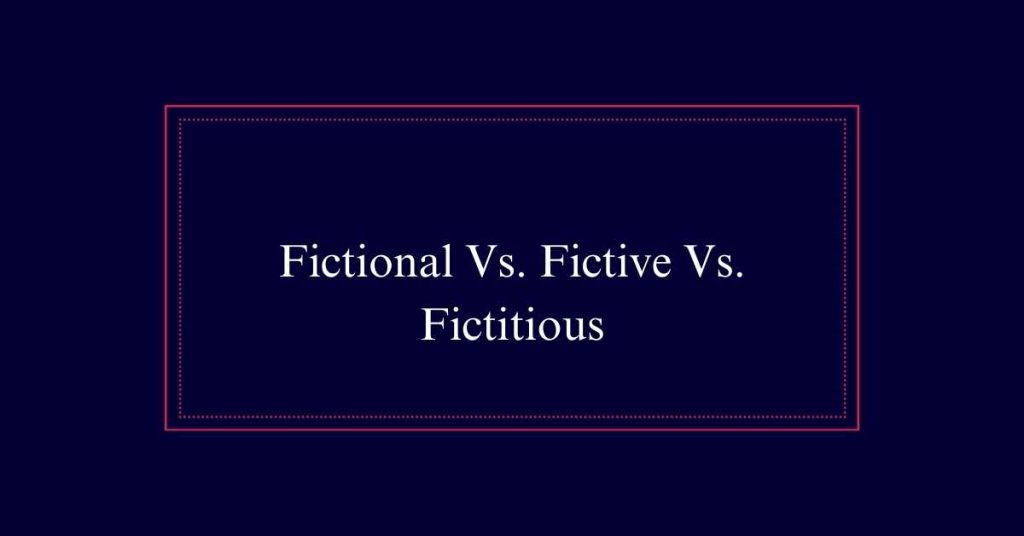Fictional Vs. Fictive Vs. Fictitious
‘Fictional,’ ‘fictive,’ and ‘fictitious’ differ in their meanings and usage. ‘Fictional’ refers to something created by the imagination, such as characters or events in novels and movies. ‘Fictive’ is used for imaginative constructs serving specific roles, like fictive kinship in sociology. ‘Fictitious’ means fabricated or false, often used for things like fake names to preserve privacy.
Definition of Fictional
Defining ‘fictional’ involves understanding it as something created by the imagination. This term is commonly applied to works of fiction such as novels, TV shows, and movies. Fictional narratives often feature characters, settings, and events that do not exist in the real world.
A well-known example is Atticus Finch from *To Kill a Mockingbird*. While fictional stories can include autobiographical elements, they remain products of creativity. The essence of fictional work lies in its ability to transport readers or viewers into an invented reality.
This imaginative quality distinguishes it from factual or real-life accounts, offering a distinct experience through storytelling. Therefore, ‘fictional’ denotes a domain where imagination takes precedence over factual accuracy.
Uses of Fictional
Fictional works serve various purposes, including entertainment, education, and social commentary. They often provide an escape, allowing readers and viewers to immerse themselves in imaginative worlds. In education, fictional stories can simplify complex concepts and make learning engaging. For instance, historical novels can bring past events to life.
Fictional narratives also offer insights into societal issues and human behavior, fostering empathy and critical thinking. Through allegory and symbolism, they can challenge existing norms and inspire change. Additionally, fictional works can reflect cultural values and collective experiences, serving as a mirror to society.

Examples of Fictional Characters
Among the most iconic characters in literature, Atticus Finch from *To Kill a Mockingbird* stands out for his moral integrity and compassion. Another beloved fictional character is Sherlock Holmes, the brilliant detective created by Arthur Conan Doyle. Holmes is known for his keen observational skills and logical reasoning.
In the fantasy genre, Harry Potter from J.K. Rowling’s series captivates readers with his journey from an ordinary boy to a powerful wizard. Elizabeth Bennet from Jane Austen’s *Pride and Prejudice* is celebrated for her wit and strong will.
These characters, though invented by the imagination, resonate deeply with readers, illustrating universal themes and human experiences. They exemplify how fictional characters can become enduring cultural icons.
Definition of Fictitious
Fictitious refers to something that is fabricated or imaginary, often used in real-life contexts to describe things that are not real or genuine. For instance, a company might create a fictitious slogan for branding purposes. This term is also commonly used when people adopt fictitious names to maintain privacy or anonymity.
Unlike ‘fictional,’ which is mainly associated with creative works like novels and movies, ‘fictitious’ is more about falsehoods or fabrications in everyday situations. For example, a story reported in the news might later be revealed as fictitious, meaning it was completely made up. The term underscores the idea of intentional creation or deceit in practical scenarios.
Uses of Fictitious
In everyday scenarios, ‘fictitious’ is commonly employed to describe fabricated elements like names, stories, or companies created for various purposes. This term is frequently used to discuss entities or details that do not exist in reality but serve a specific function in various contexts.
Here are some common uses of ‘fictitious’:
- Names: Often used to protect privacy, such as in legal cases or publications.
- Stories: Fabricated accounts that are not based on real events.
- Companies: Imaginary businesses created for educational or illustrative purposes.
- Slogans: Invented taglines for hypothetical products or services.
Real-Life Contexts for Fictitious
Real-life contexts often require the use of fictitious elements to protect privacy and illustrate concepts. For instance, legal documents might use fictitious names to safeguard individuals’ identities.
In marketing, companies may create fictitious brands or slogans for training purposes or to test market reactions. Additionally, schools and universities might use fictitious case studies to teach students without breaching real clients’ confidentiality.
In journalism, reporters sometimes use fictitious names to maintain sources’ anonymity. These fabricated elements are essential tools in various fields, ensuring that sensitive information is not disclosed while still providing realistic scenarios for practice and learning.
Definition of Fictive
Fictive refers to the imaginative creation of objects or entities for specific purposes. It suggests a heightened level of imagination and is used to describe constructs that serve a particular role or function. Unlike ‘fictional,’ which is often used for storytelling, ‘fictive’ can imply a more abstract or theoretical creation.
Here are some key points to understand ‘fictive’:
- Imaginative Ability: It highlights the power of imagination to create new concepts.
- Specific Purpose: The creations usually serve a specific role or function.
- Heightened Fictionality: It often suggests a more intense level of imaginative fiction.
- Examples: Fictive kinship, which refers to relationships like family, but not by blood.
These aspects clarify the nuanced meaning of ‘fictive’.
Uses of Fictive
The term ‘fictive’ finds its application in contexts where imaginative constructs fulfill specific roles or functions. In sociology, ‘fictive kinship’ describes relationships not based on blood or marriage but treated as family bonds. This term is also used in psychology to refer to imagined scenarios or personas that help individuals navigate complex emotions or situations.
Additionally, ‘fictive’ can denote characters or settings in literature and art that serve a purposeful role in storytelling. Unlike ‘fictional’ or ‘fictitious,’ ‘fictive’ often implies a deeper level of imaginative involvement, where the creation has a specific, functional objective within its context. This makes ‘fictive’ suitable for describing constructs with a purposeful and often symbolic role.
Comparison of Terms
When comparing ‘fictional,’ ‘fictitious,’ and ‘fictive,’ it is essential to understand their distinct applications and nuances. Each term serves a unique purpose in language, reflecting different aspects of imagination and fabrication.
Fictional: This term often refers to characters, stories, or settings invented by the imagination, typically seen in novels, movies, and plays. Example: Harry Potter.
Fictitious: Used in real-life contexts to describe something fabricated or invented, often for privacy or deception. Example: a fictitious company name.
Fictive: This term implies imaginative creation, often for specific purposes like social structures. Example: fictive kinship in foster care.
Overlap: While these terms can sometimes be interchangeable, their specific usages highlight important differences in context and intention.
Choosing the Right Term
Understanding the nuances of ‘fictional,’ ‘fictitious,’ and ‘fictive’ is crucial for choosing the right term in different contexts.
‘Fictional’ refers to characters, stories, or events created by imagination, as seen in novels or movies.
Use ‘fictitious’ when referring to something fabricated in real-life contexts, like a fictitious company name or false identity.
‘Fictive’ highlights imaginative constructs often designed for a specific purpose, such as fictive kinship in social structures.
While ‘fictional’ is common in artistic works, ‘fictitious’ is practical for real-world scenarios, and ‘fictive’ serves specialized or theoretical discussions.







